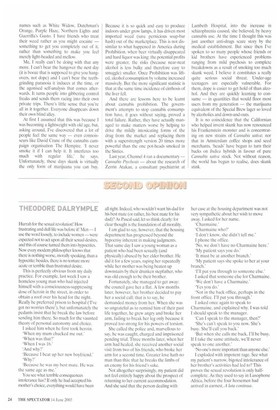THEODORE DALRYMPLE
Hurrah for the sexual revolution! How frustrating and dull life was before it! Men — I use the word loosely, to include women —were expected not to act upon all their sexual desires, and this of course turned them into hypocrites. Now every modern philosopher knows that there is nothing worse, morally speaking, than a hypocrite; besides, there is no torture more acute or terrible than frustrated desire.
This is perfectly obvious from my daily practice. For example, last week I saw a homeless young man who had injected himself with a consciousness-suppressing dose of heroin in the street, in order to obtain a roof over his head for the night. Really he preferred prison to hospital (I've got no worries there'), but unfortunately the pedants insist that he break the law before sending him there. So much for the vaunted theory of personal autonomy and choice.
I asked him when he first took heroin.
'When my mum chucked me out.'
'When was that?'
'When I was I6.'
'And why?'
'Because I beat up her new boyfriend.' 'Why?'
'Because he was my best mate. He was the same age as me.'
You see what terrible consequences intolerance has? If only he had accepted his mother's choice, everything would have been all right. Indeed, who wouldn't want his dad for his best mate (or rather, his best mate for his dad)? As Pascal said, let us think clearly: for clear thought is the foundation of all morality.
I am glad to say, however, that the housing department has progressed beyond the hypocrisy inherent in making judgments. That same day I saw a young woman as a patient who had been sexually (and physically) abused by her elder brother. He did it for a few years, raping her repeatedly while her mother was being beaten up downstairs by their drunken stepfather, who was old enough to be their brother.
Fortunately, she managed to get away: the council gave her a flat. A few months later, however, her brother decided to pay her a social call: that is to say, he demanded money from her. When she was so ungrateful as to remind him of their past life together, he grew angry and broke her arm, failing to break her leg only because it proved too strong for his powers of torsion.
She called the police and, marvellous to say, he was caught, charged and imprisoned pending trial. Three months later, when her arm had healed, she received another social visit from two of his friends, who broke her arm for a second time. Greater love hath no man than this: that he breaks the limbs of an enemy for his friend's sake.
Not altogether surprisingly, my patient did not feel entirely happy about the prospect of returning to her current accommodation. And she said that the person dealing with her case at the housing department was not very sympathetic about her wish to move away. [asked for her name.
`Charmaine.'
`Charmaine who?'
'I don't know, she didn't tell me.' I phone the office.
'No, we don't have no Charmaine here.' 'My patient says you do.'
'It must be at another branch.'
'My patient says she spoke to her at your branch.'
'Ill put you through to someone else.'
I asked that someone else for Charmaine. 'We don't have a Charmaine,' 'Yes you do.'
'Not in the back office, perhaps in the front office. I'll put you through.'
I asked once again to speak to Charmaine, and explained why. [was told I should speak to the manager.
'Can I speak to the manager, then?' 'She's can't speak to you now. She's busy. She'll call you back.'
'But when she calls me back, I'll be busy. If I take the same attitude, we'll never speak to one another.'
No one's more important than anyone else.'
I exploded with impotent rage. See what my patient's narrow, bigoted intolerance of her brother's activities had led to? This proves the sexual revolution is only halfcomplete. As they used to say in Lusophone Africa, before the four horsemen had arrived in earnest, A luta continua.


































































































 Previous page
Previous page